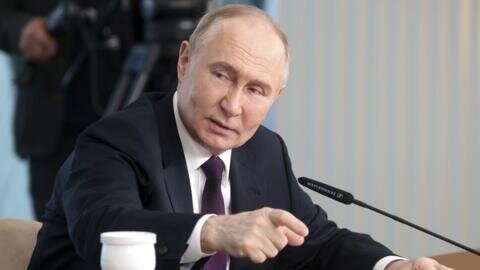Europe wants Iran to commit to JCPOA despite Washington’s withdrawal: Putin

TEHRAN – Russian President Vladimir Putin has strongly criticized the European trio (France, Germany, and the United Kingdom) for their hypocritical stance on the Joint Comprehensive Plan of Action (JCPOA), commonly known as the Iran nuclear deal.
Speaking at the St. Petersburg International Economic Forum (SPIEF), Putin accused the European trio of double standards, as they demand that Iran fully complies with the JCPOA while conveniently ignoring the fact that the United States unilaterally withdrew from the agreement in 2018.
“The United States unilaterally decided to withdraw from this agreement, and the Europeans continue to demand that Iran fulfills its obligations. Forgive me, but that's nonsense. It wasn't Iran that withdrew from the agreement. The U.S. withdrew; former President Trump decided to withdraw from the agreement. And the Europeans say: yes, it's not good that the Americans withdrew, but you Iranians should comply with everything. What does Iran have to do with it? Excuse my language, it sounds a bit harsh in Russian. But if the key player withdrew from the agreement, why should Iran bear the burden of compliance?” Putin explained.
The Russian president was responding to a question regarding a recent anti-Iran resolution adopted by the International Atomic Energy Agency’s Board of Governors on Wednesday. The resolution censures Iran for scaling back on its commitments under the JCPOA.
Raisi “reliable partner” for Russia
Elsewhere in his comments, Putin lauded the late Iranian President Ebrahim Raisi’s role in strengthening Russia-Iran ties.
Responding to a question from IRNA's Managing Director, Ali Naderi, Putin highlighted Raisi's instrumental role in expanding bilateral ties, stating that the two countries are "on the right track" and committed to further developing their partnership.
“We are pursuing the agreements reached during Raisi’s term, and we are on the right track and are expanding our relations. Mr. Raisi played a significant role in this regard. We had very reliable, good, and business-like relations with him. He was a very interesting person, and he was a serious politician, a reliable partner,” the Russian leader explained.
“He had a little bit ironic attitude toward life, and he had a sense of humor. It was interesting to maintain relations with him right away. It was interesting and useful, because I repeat once again, if we agreed on something with him, we could be confident for a long time that this topic that we are talking about will not be forgotten,” Putin continued.
The president also praised Raisi's efforts in raising Iran's international profile, particularly its accession to the Shanghai Cooperation Organization and the BRICS group.
“This is still a sign that we were moving in the right direction, first and foremost in terms of the rise of a multipolar world, and Iran played and continues to play a very important role in this.”
Despite facing sanctions, the president emphasized the robust growth of economic ties between the two nations, expressing a desire for further collaboration, particularly in the high-tech sector.
“But, the fact remains, we have a whole plan for joint work. Our trade and economic ties are growing. Of course, in general, we would like to see additional efforts to develop cooperation in the high-tech field,” he stated.
President Raisi lost his life during a helicopter crash in northwestern Iran on May 19. Foreign Minister Amir Abdollahian and six other officials also perished alongside the late president.
Putin concluded by advocating for a multipolar world order based on cooperation, citing the strong ties between Russia, China, and Iran as a prime example.
“The world is being formed based on the cooperation we are witnessing between Russia, China, Iran, and other countries. Iran is a powerful country and no one is supposed to be a slave or under the western flag. Iran and Russia are two emerging countries in the economic field, and this is what worries Western leaders,” he added.
